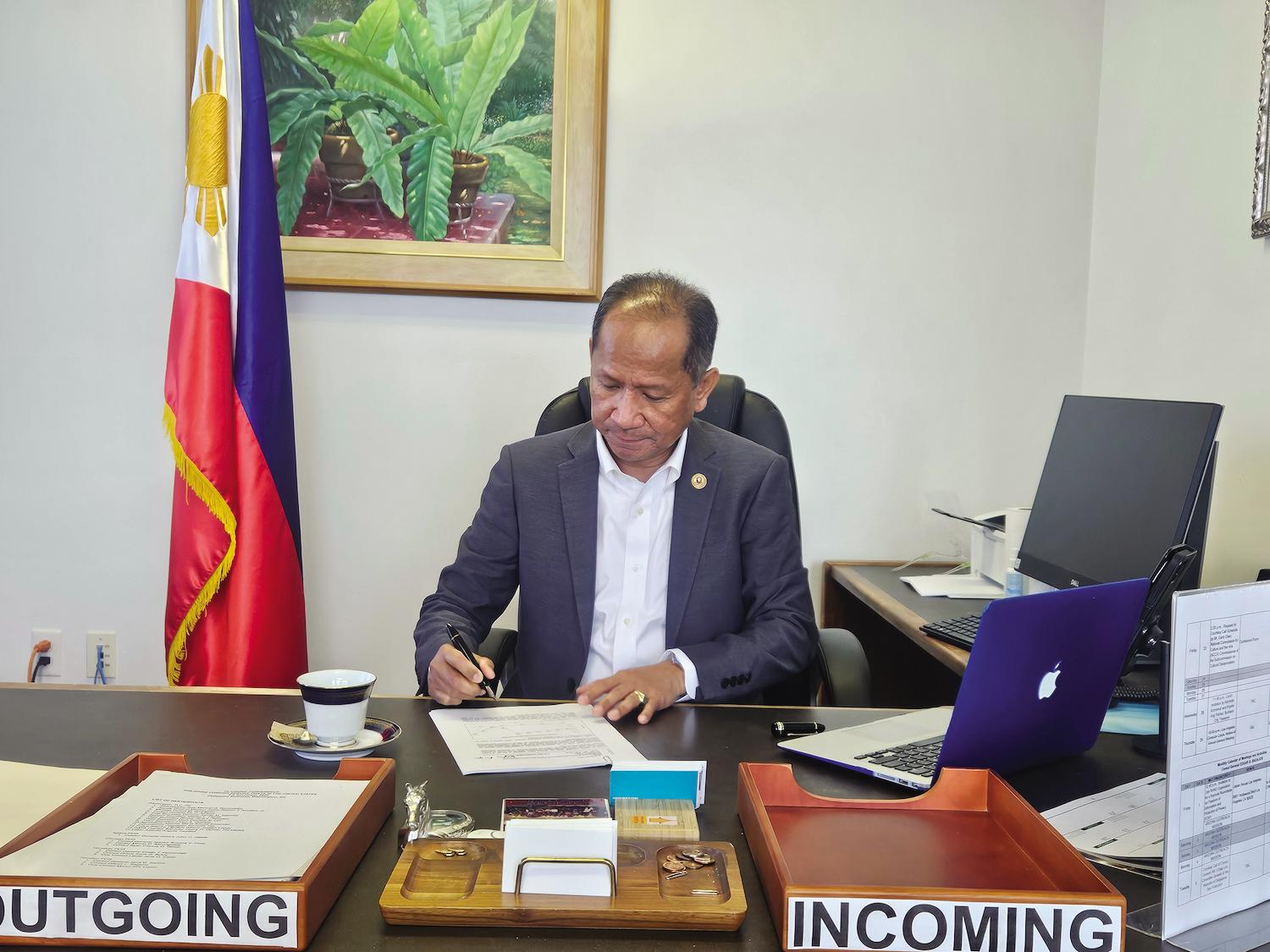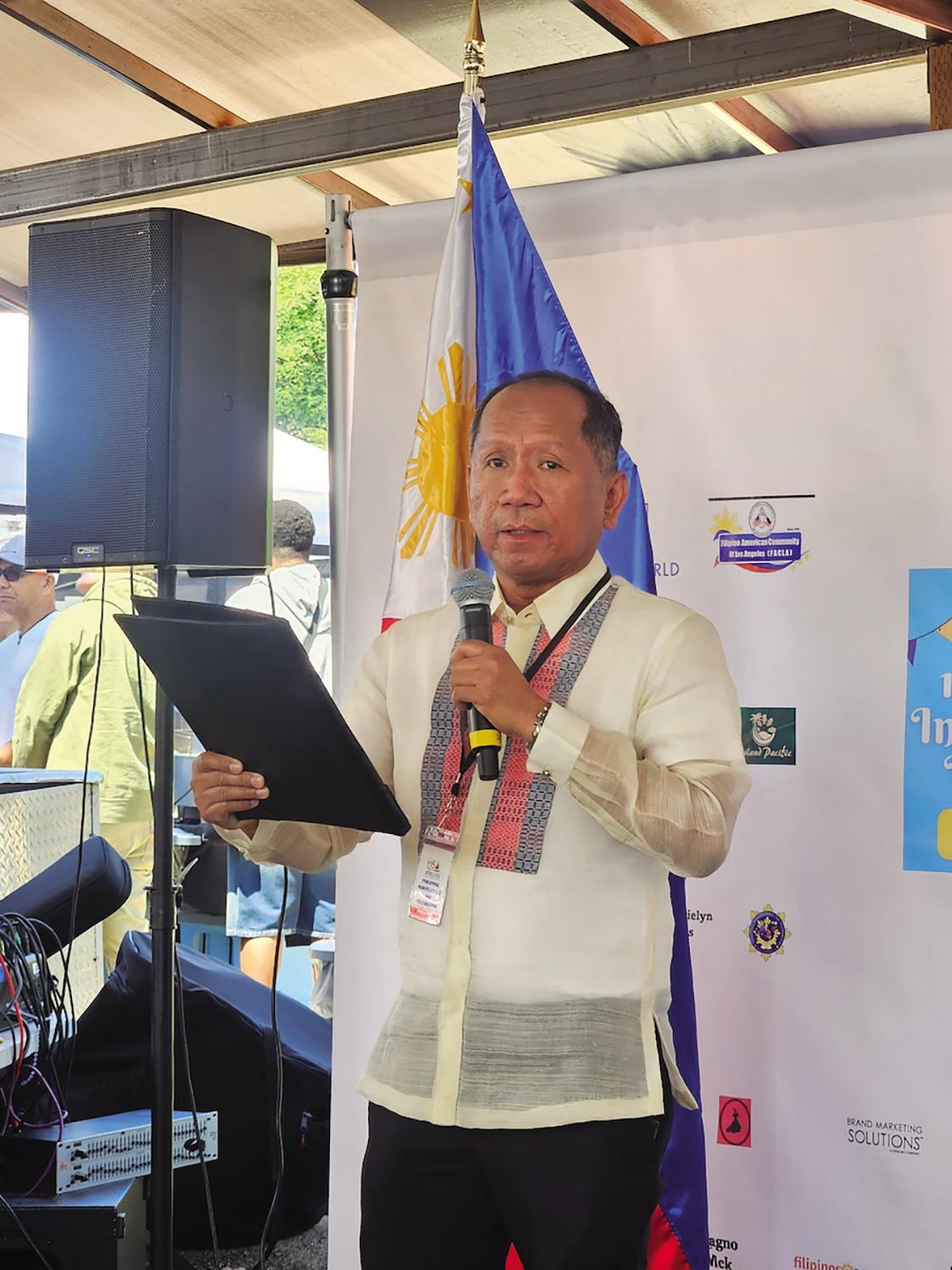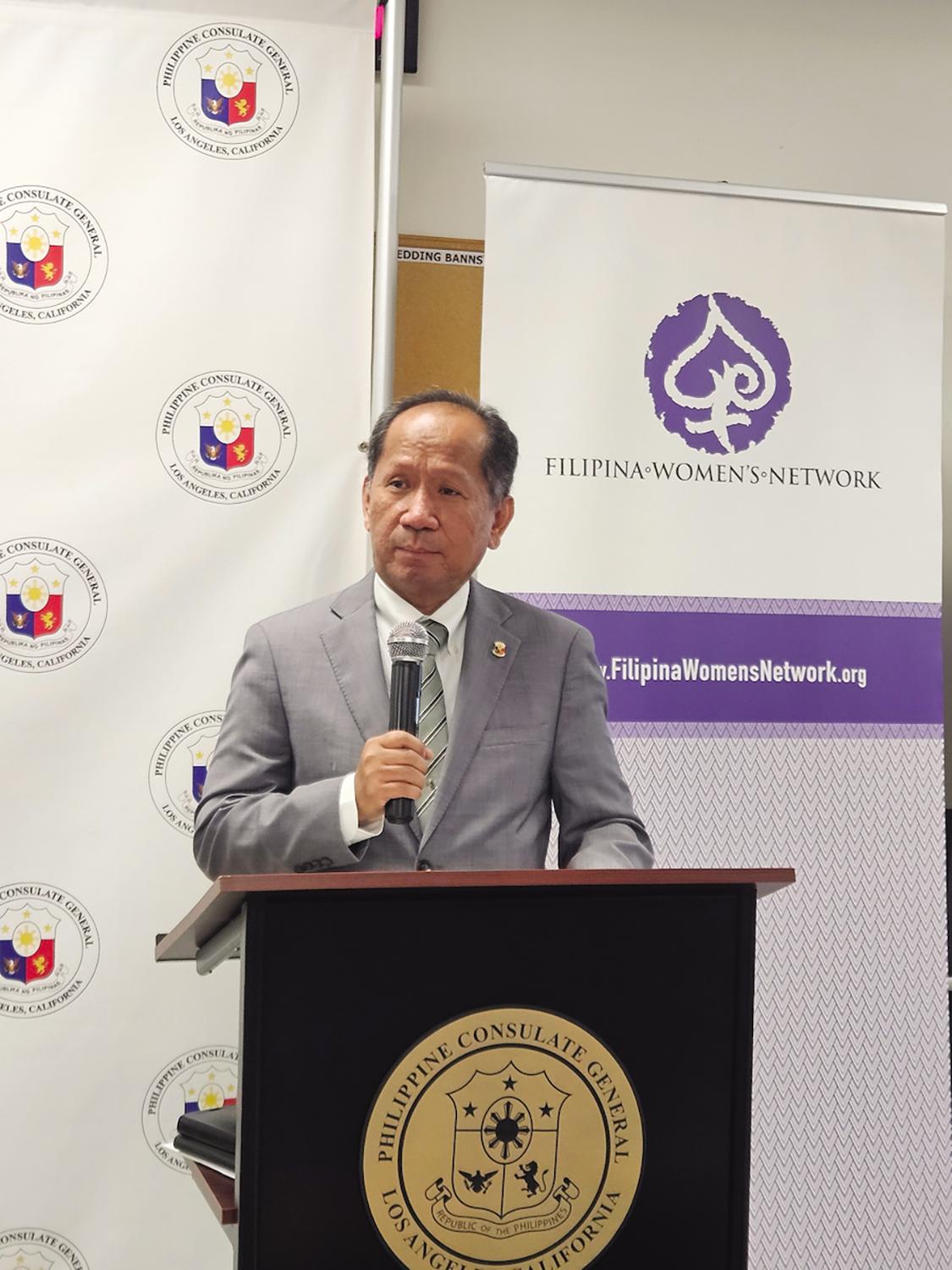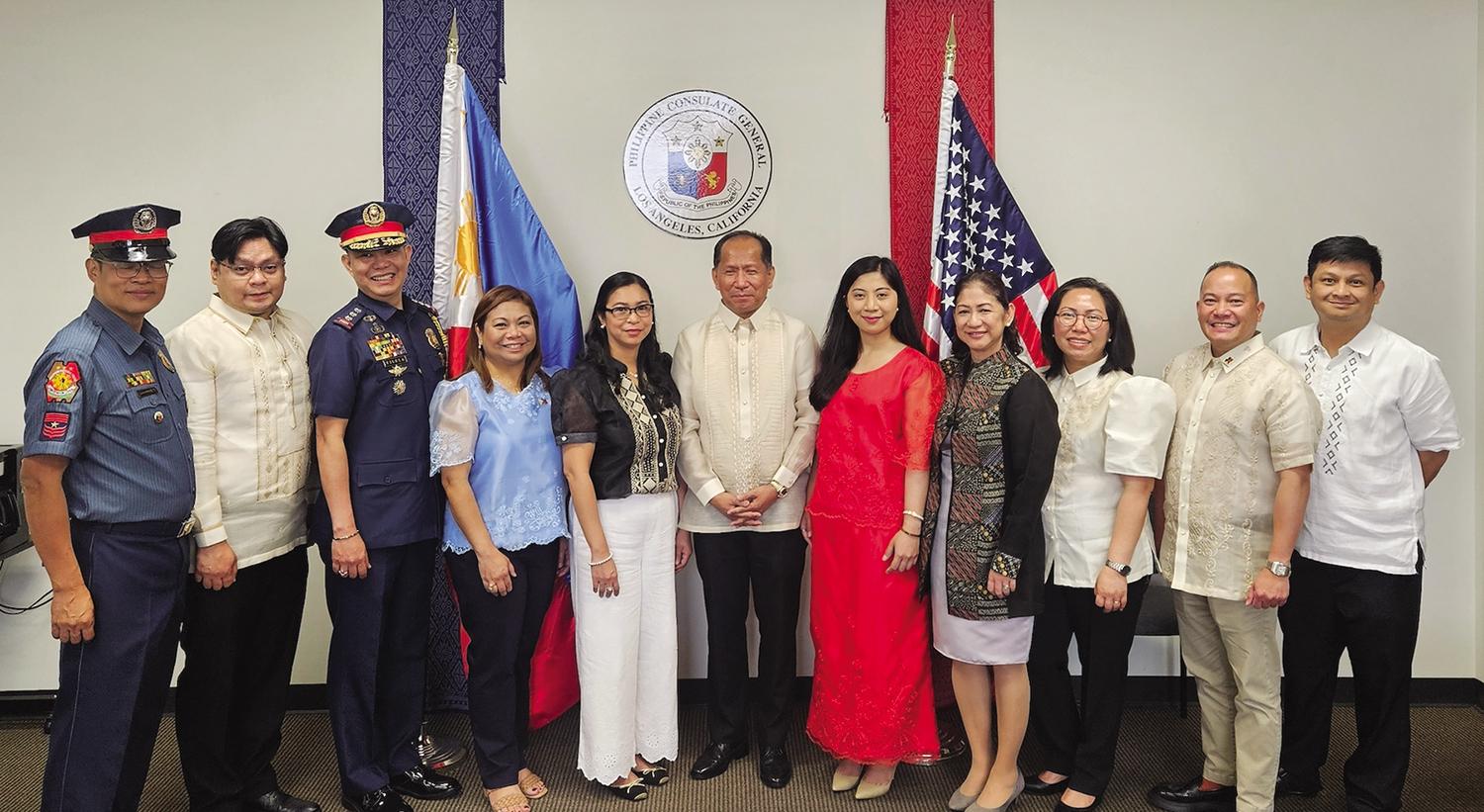
By: Mic Diaz
I’VE had the pleasure to get to know Honorable Philippine Consul General Edgar Badajos Jr., better known as ConGen to many of us in Southern California and Nevada, during his tenure as Consul General of Los Angeles. I first had a chance to chat with him in depth a couple of years ago when we happened to sit right next to each other at the musical “Lorenzo Ruiz” at the Aratani Theatre in Little Tokyo, Los Angeles. He strikes me as an exceptionally eloquent man who was willing to talk to anyone.
A few months ago, I had an in-depth conversation with him for my podcast, Chat With Mic, in his office — a more familiar ground.
On why ConGen chose to work in the Department of Foreign Affairs
Initially he worked in the Philippine Senate drafting appeals for the legislation. According to ConGen, in his private moments, he reflected on what his contribution is on the community and Philippine society in general. ConGen comes from a family of overseas Filipino workers (OFWs) and his older brothers sent him through college. In 1995, the story of Flor Contemplacion, a Filipina domestic worker who was executed by hanging in Singapore, opened ConGen’s eyes. He thought that proposed legislation may not be enough, and he decided to join the foreign service. At the time, OFWs were at the forefront of Philippine foreign policy. ConGen thought that maybe he can be of greater help to overseas Filipino workers including his brothers who were working in Saudi Arabia at the time. He stressed, “we needed to do more to help them.”
Three pillars of Philippine foreign policy
ConGen recounts the three pillars of Philippine foreign policy, which starts with protecting the country’s political interests, protecting the country’s economic interests, and protecting overseas Filipinos.
Giving back to his brothers and overseas Filipino community
According to ConGen, working in foreign service is a way of giving back to Overseas Filipino Workers who are now 10 million strong — to help them and to protect them while they are overseas.
On his experiences in Jeddah, Thailand, Los Angeles and New York
“Jeddah is so different from where we are right now (Los Angeles). We’re talking about Saudi Arabia…where we’ll find Overseas Filipino Workers in the true sense of the word. These are Filipinos who pass through the Philippine Overseas Employment Administration (POEA) who are able to work for various employers in Saudi Arabia who really need the assistance of our government. There’s a lot of work that needs to be done in terms of protecting the rights of household, domestic helpers. Our government must be at the forefront to protect the rights of our Filipino workers.”
In Thailand, ConGen says, “There are only 15,000 OFWs, most of which are English teachers.” Therefore, the consulate doesn’t encounter problems as much as you would find in Saudi Arabia.
“In Los Angeles, we don’t have that kind of problem like in Saudi Arabia where we receive phone calls every hour, every day from workers needing assistance, intervention from the Philippine government to rescue them from abusive employers, from working conditions that are not so desirable.”
ConGen quips, “Here in California, the usual problem is how to budget our time, because we have so many parties.”

He added, “We go there to get a sense of what is going on in our community. We go there to listen to you, to the Filipinos on the ground. We are there to listen so that we can convey your sentiments to our government back home. We can also adopt programs and services to make life even better for your relatives back home who are left and also to make your next visit to the Philippines even more enjoyable.”
“Just like what is happening in Los Angeles, we see that a lot of our fellow Filipinos (in New York) are organizing events and parties. They’re actually doing it for a higher purpose to target beneficiaries back home.”
ConGen’s childhood and college days
ConGen recounted his days in college as a chairman of the student council of UP Baguio at the height of the protests of the Marcos regime. He saw that the student body needed to be more active and more vocal about fighting for their rights and interests. He added that during his time, he was able to see a lot of projects completed at his campus.
He then said that at a young age, he knew that he cannot just be confined to where he was. He knew he was destined to do higher things, better things. He felt that he had the capacity, the talent to do so much more. He added, “There was an inner feeling that I was meant to do greater things. I had a gut feeling that I had a higher calling.”
ConGen affirmed, “I am living my dream far more than what I had anticipated for myself.”
Advise for college students
“You have to understand that the things that you will eventually need to survive in the real world, you will not learn in the four corners of the classroom. You have to open your mind. You need to widen your horizon. You have to participate in non-academic activities. Involve yourself in campus politics. It’s not enough to just go to school. It’s necessary for you to expose yourself to other experiences. Student organizing will prepare you for the challenges of the real world. It’s very different out there. You cannot just erase your mistakes in the outside world unlike in the classroom.”
ConGen’s favorite destination
He added that his favorite destination would still be Manila, “because that’s where you have your family. You can say that this is my own place. You could do whatever you want. Of course, within certain limits. And that is where you can claim that this is the place that made you what you are today. So you have to make it number one.”
He went on to say that his next favorite destination is Toronto, Canada. It has the feel of a big city and at the same time it has the feel of a small place.
Solving traffic issues in Manila
“We have traffic here. During rush hours, the 101 feels like EDSA too. We don’t have a monopoly of this traffic problem. These things come along with modernization. That’s one of the prices we pay for economic development. We have to have more infrastructure. We need more mass transit. We need to expand our existing mass transit system. It matters a lot if the drivers have a lot of personal discipline observing traffic rules and regulations. That is what we sorely lack back home.”
ConGen’s home
ConGen considers Abra his hometown where he maintains a mini resort. He affirms, “it will always be where my heart will belong.” Looking forward to his retirement, ConGen states that he will be commuting from Las Piñas where he has established residence, to his province of Abra and the provinces of Cavite and Quezon.
His advocacy
He encourages kababayans to visit and to participate in medical and dental missions in depressed areas of Abra. He added that although there is a high level of economic development in the country, there are still pockets of people living below the poverty line in rural areas. Furthermore, he is appealing to fellow Filipinos to lend a helping hand to the province of Abra that is still recovering from an earthquake and several typhoons.
How to make the Philippines a better place to live

According to ConGen, there are a lot of Filipinos here in Los Angeles and Southern California who are sending help through fundraising events and remittances.
Fondest memories of his stay in Los Angeles
His fondest memories of his tenure here in Southern California is the establishment of an honorary consulate in Las Vegas and having met a lot of friends from a very active, dynamic and involved community.
On representing the Philippines

Photos courtesy of Mic Diaz
He says, “Although the consulate is the official designated representatives of the country, actually each and every one of you is the representation of the country. You are actually our informal ambassadors of our country. The Filipino is a very economically productive, so hardworking, so talented, so God-fearing and so caring of their families. Therefore, you are making our lives easier at the consulate. One of our responsibilities is to promote greater understanding and awareness of Filipino culture. But because of the presence of the 1.3- to 1.4 million-strong Filipinos here, our job becomes easier not just in terms of promoting Filipino culture, but also in terms of promoting good political and economic relations with our host country.”
Advise for the next Consul General
“Be very open and transparent and friendly, because the more you are, work at the consulate becomes more enjoyable.”
As the saying goes and as ConGen himself says, “This is not goodbye, but see you later.”
Thank you for your service to Filipinos and Filipino-Americans in Southern California and Nevada.
* * *
The opinions, beliefs and viewpoints expressed by the author do not necessarily reflect the opinions, beliefs and viewpoints of Asian Journal, its management, editorial board and staff.
* * *






